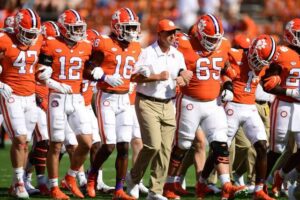
News Flashback Thursday: The LSU Geaux Tigers Had One of the Greatest Football Seasons Ever
The LSU Tigers, representing Louisiana State University in Baton Rouge, have a storied history full of legendary football seasons. Yet, the 2003 season stands as one of the most iconic and unforgettable in the history of college football. As we take a step back to relive that magical season, it’s impossible not to feel the electric atmosphere of Tiger Stadium, the roar of the crowd, and the unrelenting drive of a team that was determined to reach the pinnacle of college football.
In the fall of 2003, the LSU Tigers embarked on a journey that would culminate in a national championship and forever cement their place in football history. Under the leadership of head coach Nick Saban, the Tigers achieved an extraordinary 13-1 record, captured the Southeastern Conference (SEC) title, and claimed the BCS National Championship, defeating Oklahoma in the Sugar Bowl. The season was a masterclass in resilience, talent, and grit.
A New Era: Nick Saban’s Leadership
When Nick Saban took over the LSU football program in 2000, the Tigers had been struggling to regain their former dominance in college football. While they had a rich history, including national titles in 1958 and 2003, the program was looking for the right coach to guide it into the new millennium. Saban was the perfect fit.
Saban’s arrival marked a new era of discipline, structure, and excellence. His relentless work ethic and obsession with perfection transformed the Tigers into a powerhouse. By 2003, his program had built a strong foundation that was beginning to show results. The year before, LSU had made an appearance in the SEC Championship Game, which was a big step toward regaining the program’s status among college football elites.
The 2003 season was the culmination of everything Saban had been working toward. His leadership, combined with the raw talent on the roster, propelled LSU into national prominence. His attention to detail and ability to motivate his players were key factors in their success.
The Road to the National Championship
LSU’s 2003 season was not without its challenges. It began with high expectations, as many analysts and fans predicted that the Tigers would contend for a national championship. However, despite the early promise, the season also included its fair share of setbacks.
The Tigers kicked off the season with a dominant 45-3 victory over Louisiana-Lafayette. Following that, LSU rolled through their early schedule, including impressive wins over Mississippi State and Alabama. However, it was a 31-20 road win over the Arkansas Razorbacks that started to show the world just how special this team was. With quarterback Matt Mauck at the helm, the Tigers appeared to be in midseason form, executing both on offense and defense with precision and power.
But the season’s first real test came against the Florida Gators in mid-October. The Gators, led by coach Ron Zook, were an SEC powerhouse, and their fast-paced offense was a challenge for LSU’s defense. In a hard-fought battle in Baton Rouge, the Tigers came out on top with a gritty 19-7 win, a game that demonstrated the Tigers’ resilience and their ability to grind out tough victories.
Yet, the most significant moment of the season occurred on November 8, 2003, when LSU hosted the Alabama Crimson Tide in Tiger Stadium. This was not just another regular-season game; it was a showdown between two of the top teams in the country, and it was set against the backdrop of a fierce rivalry that ran deep in the hearts of the players, coaches, and fans alike.
LSU entered the game ranked No. 3 in the nation, while Alabama was ranked No. 15. The atmosphere in Tiger Stadium was electric, and the stakes could not have been higher. Despite a strong performance from Alabama’s defense, LSU’s offense proved too much to handle. Behind Matt Mauck’s poise and the hard-running of running back Justin Vincent, the Tigers managed to escape with a thrilling 31-7 victory. That win helped LSU continue to build momentum as they prepared for their showdown with Ole Miss the following week.
The SEC Championship and the Sugar Bowl
As the Tigers closed out the regular season, they faced Ole Miss in a game that would determine their fate in the SEC Championship Game. Ole Miss, led by quarterback Eli Manning, was no pushover, and the game would prove to be one of the toughest challenges of the season.
LSU entered the game as the higher-ranked team, but Ole Miss had a dangerous offense that could quickly shift the momentum of the game. Still, LSU’s defense, which had been one of the best in the country all year, rose to the occasion. The Tigers’ defense shut down Manning and the Rebels’ offense, holding them to just 17 points. LSU’s offense, meanwhile, was efficient, with Matt Mauck and Justin Vincent leading the way. The Tigers won the game 17-14, securing their spot in the SEC Championship Game against the Georgia Bulldogs.
In the SEC Championship Game, held on December 6, 2003, in Atlanta, LSU faced a tough Georgia team that was coming off a strong season. Despite the challenge, LSU proved they were the better team. In a hard-fought battle, LSU defeated Georgia 34-13 to claim their first SEC title since 1988. The victory not only solidified their status as the best team in the SEC but also earned them a spot in the Sugar Bowl, where they would face the top-ranked Oklahoma Sooners in the BCS National Championship Game.
The anticipation for the Sugar Bowl was palpable. LSU was the underdog, with Oklahoma being widely considered the best team in the nation. The Sooners, led by Heisman Trophy winner Jason White, had been nearly unstoppable all season. However, LSU’s defense was up to the challenge.
On January 4, 2004, in the Sugar Bowl, LSU faced Oklahoma in a game that would define their season. From the opening kickoff, it was clear that the Tigers were not going to back down. LSU’s defense, spearheaded by defensive coordinator Will Muschamp, pressured White throughout the game, limiting the Sooners’ offense to just 154 total yards. The Tigers’ offense, meanwhile, was explosive and efficient, with Matt Mauck connecting with wide receiver Michael Clayton for two key touchdowns.
LSU’s 21-14 victory over Oklahoma was a masterclass in defensive football. The Tigers’ defense stifled the Sooners’ high-powered offense, and the win not only gave LSU their first national title in 45 years but also sealed Nick Saban’s legacy as one of the top coaches in college football.
Legacy of the 2003 LSU Tigers
The 2003 LSU Tigers’ season was one for the history books. Their victory in the BCS National Championship Game, combined with their dominant play throughout the regular season and SEC Championship Game, solidified their place as one of the greatest teams in college football history. LSU’s win in the Sugar Bowl was the culmination of years of hard work, discipline, and dedication, both from the coaching staff and the players.
The team’s success was also a testament to the strength and unity of the LSU football program. From the offensive line to the defensive backs, every player on the roster contributed to the championship season. Matt Mauck, who had been instrumental in LSU’s success, was named the game’s Most Outstanding Player in the Sugar Bowl. His calm and steady play in big moments, especially in the national championship game, earned him a place among the great quarterbacks in LSU history.
Equally crucial to LSU’s success was their defense. The Tigers’ defense was led by future NFL stars like Marcus Spears, Corey Webster, and Chad Lavalais. Their ability to shut down opposing offenses, as evidenced in the Sugar Bowl, was a key factor in LSU’s title run. The defense was a true reflection of Nick Saban’s coaching philosophy: relentless, disciplined, and aggressive.
Nick Saban’s success with LSU in 2003 marked the beginning of a new era for the Tigers. His ability to recruit and develop talent was evident throughout the roster, and the championship season served as a springboard for future success. Saban would go on to become a coaching legend, leaving LSU for the NFL and eventually returning to college football at Alabama, where he would continue his dynasty.
The 2003 LSU Tigers also laid the foundation for a new era of success for the program. Under Saban’s tutelage, LSU would continue to be a perennial contender in the SEC and on the national stage. The team’s success in 2003 inspired future generations of Tigers players, coaches, and fans, and the legacy of that national championship season lives on to this day.
As the years have passed, the 2003 LSU Tigers are often remembered as one of the greatest teams in college football history. The thrilling victories, the unforgettable plays, and the unrelenting spirit of the players and coaching staff make that season a cherished memory for LSU fans. In the years that followed, LSU would claim additional national titles and continue to be a powerhouse in college football, but the 2003 championship remains a defining moment in the program’s history.
For LSU fans, the 2003 season was a magical journey that ended with the ultimate prize: a national championship. It was a season that will never be forgotten, a season that proved that with the right leadership, talent, and determination, anything is possible. The Tigers were, and will forever remain, the Geaux Tigers of 2003.





